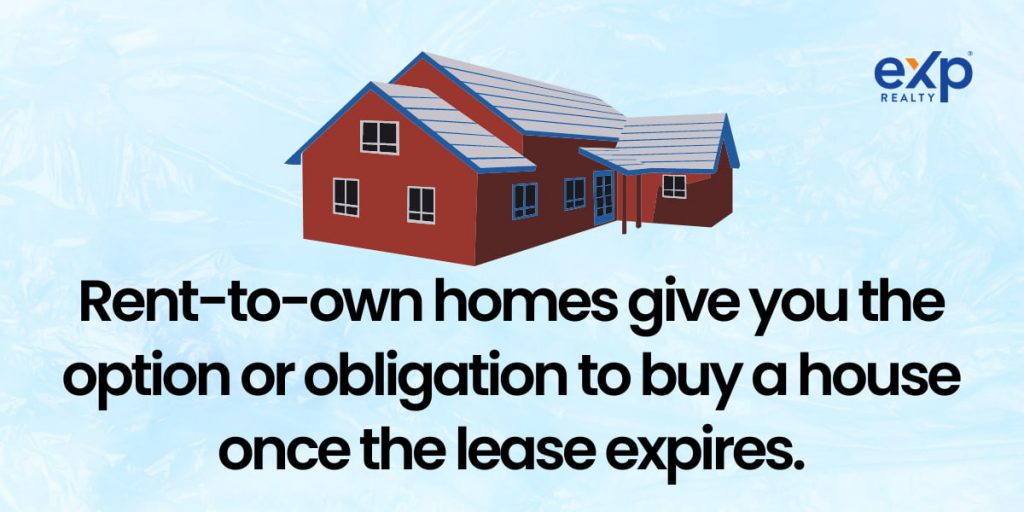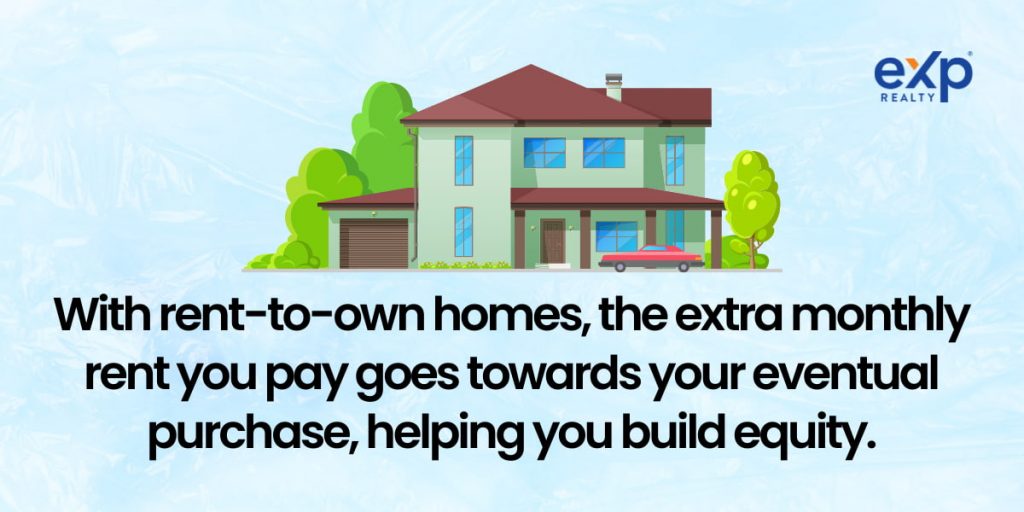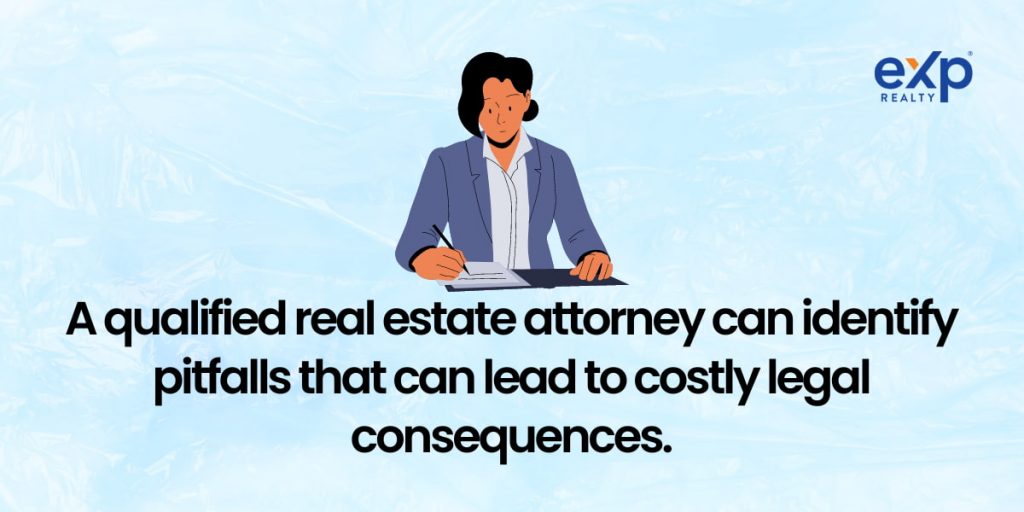To read this guide in Español, please visit https://exprealty.com/guides/casas-en-renta-con-opcion-a-compra-una-guia-para-saber-como-funcionan/
Owning a home is something that most people hope to achieve. Having a place to call your own, with no landlord or rules to follow, can be rewarding and liberating.
However, going by the latest National Association of Realtors report, this option may be unattainable for some. A median single-family home for sale can cost as much as $398,500. That’s an enormous chunk of money, especially for first-time buyers.
Fortunately, there are alternatives, such as rent-to-own homes. This guide will look at rent-to-own, how it works, and its pros and cons so you can decide if it’s the right choice for you.
What Are Rent-to-Own Homes?

Rent-to-own homes give you the option or obligation to buy a house once the lease expires.
In this agreement, you pay a slightly higher-than-market-rate monthly rent, with the extra amount going toward a down payment. Additionally, a certain percentage of the purchase price is mandatory to hold the option of buying the home in the future.
Rent-to-own homes are a good alternative for those looking to own a property but can’t because of the traditional mortgage system. It allows you to save and build up your credit score while reaping the benefits of homeownership.
Lease Purchase vs. Lease Option
Before entering into a rent-to-own program, it’s critical to understand the different types of leases available. They safeguard the buyer’s and homeowner’s rights, interests, and responsibilities.
In this case, there are two: lease-purchase and lease-option. While both allow you, as the renter, to lease a property for a given period with the option to purchase it later, they have some key differences.
Lease-Purchase Agreement
A lease-purchase agreement allows you to lease the home for a set period of time, with a portion of the rent going toward the future down payment. However, it legally obligates you to buy the house once the lease expires, whether or not you can afford it.
The first step to entering this type of contract is determining the purchase price. You and the seller can either agree on the price before signing the lease or schedule an appraisal and decide later. This gives you an idea of the amount you’ll need, and start looking for ways to secure financing early.
Once all the details are worked out, you can sign the agreement and move in until the lease expires. At that point, you must buy the home. If you don’t, you’ll forfeit all of your rent credit and down payment. Worse, the homeowner can sue you for breach of contract and seek reimbursement for any losses incurred.
Lease-Option Agreement
A lease-option agreement functions similarly to its counterpart, except that you, as the tenant, can purchase the home at the end of the lease. In other words, you’re not under any obligation to buy, but you can if you so desire.
To enter into this type of contract, you must pay an option fee, which grants you the exclusive right to buy the property at the end of the lease. In most cases, it’s usually capped at no more than 1-5 percent of the purchase price. It’s also non-refundable and goes towards the down payment.
You also pay monthly rent but above the market rate. While you may think this is unfair, the extra money goes towards your future down payment, saving you in the long run.
Once the lease expires, you can always negotiate with the homeowner on a fair purchase price. The process is straightforward and may start with inspections to ensure that the property meets your standards and complies with local laws. From there, an appraisal is conducted to determine its net worth.
If everything looks good, you can proceed with the purchase. Otherwise, you can walk away from the deal with no strings attached. However, if you opt for this path, you’ll forfeit the option fee, and the amount already paid for rent.
Benefits of Rent-to-Own Arrangements
So, why should you consider the rent-to-own home model? Here are some of its benefits:
Build Equity While Renting

This is your best option if you’re an inspiring homeowner but can’t qualify for a mortgage or a loan. With rent-to-own homes, the extra monthly rent you pay goes towards your eventual purchase, helping you build equity. Furthermore, it improves your credit score and provides a good background for potential lenders.
No Large Down Payment Required
In most cases, the down payment to secure a rent-to-own house is much smaller than that of a conventional loan. At only 1-5 percent of the total purchase price, you can get the keys to your future home without breaking the bank. It’s also negotiable, allowing you to reduce it even further to fit your budget.
Lock in Future Purchase Price
Due to factors such as inflation, supply, and demand, real estate prices can fluctuate significantly over time. As a result, you may find yourself at a disadvantage, mainly if the market takes an unexpected turn.
With a rent-to-own arrangement, you can freeze the purchase price at today’s rate for the duration of your lease, providing you with more stability.
Try Before You Buy
No model allows you to explore the property and its surroundings like a rent-to-own home. It’s the perfect solution if you’re unsure whether you can commit long-term.
It allows you to experience the place and decide if it’s the right fit for you. If you’re looking for a low-risk and flexible way to become a homeowner, this might be right for you.
Keep Tenants Accountable
From the landlord’s perspective, this route to homeownership keeps tenants accountable. Since they’re investing in the property, they’re more likely to take better care of it. It also minimizes vacancy risk and ensures a steady income stream for the owner.
Option To Buy or Walk Away
The beauty of this approach, particularly with the lease option agreement, is that you can decide whether or not to buy the property at the end of the term.
If the situation isn’t right for you, you can simply walk away with no obligations or repercussions. Otherwise, you can take advantage of the purchase option and enjoy the fruits of your labor.
Shared Repair Costs
Any repair costs are usually split between you and the landlord, providing both parties an extra protection layer.
In most cases, the tenant is responsible for minor repairs, while the owner handles the major ones. This can help alleviate some of the stress of owning a home and give you peace of mind.
How Rent-to-Own Homes Work

The process of renting to own a home is time-consuming and fraught with legal jargon. If you’re taking this path to homeownership, it pays to have a knowledgeable lawyer or real estate agent to help guide you. In general, this is how a rent-to-own program works:
1. Sign a Rent-to-Own Agreement With the Seller
The agreement outlines the terms of the rent-to-own deal, such as the purchase price, rent payment amount, and lease length.
As previously stated, there are two types of contracts: lease-purchase and lease-option. The first one gives you, the buyer, the option to purchase the property at the end of the lease. However, you’re legally obligated to buy the house with the latter choice.
With a lease purchase contract, you’ll want to exercise caution. Even better, engage an attorney to ensure no hidden fees or expenses are included. Additionally, get pre-approved for a mortgage loan to determine whether you qualify for one when the right time comes.
2. Set a Purchase Price
Upon signing the contract, you and the seller must agree on the sale price. Traditionally, this job falls to a real estate agent. However, when it comes to rent-to-own homes, they don’t get involved since there is no guarantee that the buyer will proceed with the deal.
Therefore, it’s up to you to do your due diligence. Research comparable properties’ prices to ensure you get the best deal. Pay attention to the current market trends and factor in any potential repairs you may need. You can also have a professional home inspection done.
Once you come up with an offer, discuss it with the homeowner to reach an agreement. Depending on the property value, you can set the purchase price now but at a higher rate than the current market value or the projected rate when the lease expires. However, due to unpredictable and ever-changing market conditions, most buyers prefer to lock it in.
3. Pay a Non-Refundable Upfront Fee
The seller requires you to pay a one-time, non-refundable option fee. It gives you the exclusive right to buy the property at the agreed-upon price once the lease expires or at a future date. The negotiable fee typically ranges between 1-5 percent of the sale price.
4. Establish the Rental Term’s Length
Contracts for rent-to-own homes usually last anywhere from one to three years. Before agreeing to a specific length of time, consider your situation carefully. Ask yourself if you’ll have improved your credit score to qualify for a mortgage loan by then. If not, negotiate with the homeowner for a favorable extension before signing the contract.
5. Determine Rent Payments
Unlike a traditional rental agreement, the amount you pay each month to the homeowner is usually higher than the market value. The extra money is usually capped at 25-30 percent of the monthly rent and goes towards the final purchase of the house. Remember to put it in writing to avoid future misunderstandings.
6. Define Maintenance and Repair Responsibilities
Establish who is responsible for the upkeep and maintenance of the home. Agree on how repairs will be handled and who will pay for them. Having maintenance and repairs stipulated in the contract is vital to avoid disputes and costly legal proceedings.
Generally, this burden falls to the homeowner. After all, it’s still their property since you don’t own it until the lease is over and the purchase is finalized.
To be safe, get a tenant insurance policy to protect your possessions against theft or damage. It’ll also provide coverage in case someone else is injured while in your home.
7. Buying the Home
Depending on the agreement for your rent-to-own home, you’ll have either the option or obligation to purchase the home at the end of the lease.
You’ll need to secure financing through a mortgage lender if you choose to buy the home in the end. Do your research and shop around for the best rates. Once approved, you can proceed to close the deal and take ownership.
If you have a lease-option contract and decide to walk away, you’ll only forfeit the money you put towards the option fee and any rent credits you earned.
Conversely, if you have a lease-purchase agreement and back out, you may be sued since you’re legally obligated to buy the house when the lease ends. Always treat this option with extreme caution and seek legal advice before signing.
Risks of Rent-to-Own Homes
While there is no denying the potential benefits of rent-to-own homes, there are also risks.

Loss of Earnest Money Deposits and Rent Credits
If you fail to honor your rent-to-own contract, you may lose your down payment and any rent credits you’ve accrued. This could be thousands of dollars you could have saved or used to purchase other items.
For this reason, it’s crucial that you fully understand what goes into your rent-to-own agreement before signing.
Higher Than Market Value Rent Costs
Rent for this type of legal agreement can be up to 30% higher than the going rate for comparable properties. Additionally, the monthly payments may become unmanageable if the tenant suffers a financial setback.
However, the extra chunk of rent does go toward your future down payment, so you could be doing yourself a favor (as long as you see the contract through).
Unpredictable Market Value Changes
Housing market values can be unpredictable and may rise or fall throughout the rent-to-own agreement. For example, inflation may drive up the home’s value, making the purchase more expensive than expected.
If that’s the case, you, as the buyer, should consider including a clause that the purchase price should be at least equal to the agreed-upon amount.
A Non-Refundable Option Fee
To qualify for the rent-to-own agreement, the renter must pay a one-time non-refundable option fee, usually equivalent to 1-5% of the home’s purchase price.
While it may appear insignificant, it is a substantial sum, particularly for those with limited funds. As a result, it may inhibit buyers with the potential for good credit scores from owning their dream home.
No Ownership if You Don’t Qualify for a Loan
If you cannot qualify for a mortgage after the lease period, you may lose all the money you have invested in rent and other fees. All the benefits accrue to the homeowner, who may decide to rent or sell the property. Always ensure that you’re financially secure when it’s time to purchase the home.
Tips for Successful Rent-to-Own Agreements
Agreeing to rent-to-own properties can be a complicated process. Here are some tips for making sure your process goes smoothly.
Read and Understand the Terms
Agreements are complex and full of legal language. You want to ensure you read and understand every detail before signing on the dotted line. A small mistake can lead to big problems in your future contractual obligations, so it’s best to take your time and get it right.
For instance, check the following:
- How much of the rent and option fee applies toward the purchase price?
- The lease expiry date
- Definition of “maintenance”: Is it just raking and mowing the lawn, or does it include more extensive repairs
- If there are restrictions on renovations
- Monthly rent deadline
- Restrictions on pets or tenants
- Who is responsible for paying insurance and property taxes
Pay close attention to lease-purchase provisions to avoid a potential lawsuit for non-compliance.
Have a Lawyer Review the Contract

A qualified real estate attorney can identify pitfalls that can lead to costly legal consequences. They can also help you negotiate more favorable terms and protect you in case of unexpected events. Hiring one saves you time, money, and hassle.
Research the Neighborhood and Property Value
Before signing a rent-to-own agreement, research the home and ensure it’s worth the price. Investigate zoning changes, local schools, the housing market, and any new businesses coming in.
If possible, visit the neighborhood in person. Talk to residents and look for signs of potential problems to ensure it’s the right fit for you. The last thing you want is to be stuck on a property that has dropped in value.
Get a Home Inspection
If you’re unsatisfied with the home’s condition, hire a professional inspector to look it over. They can provide a detailed report to help you decide if it’s worth buying.
Also, ensure that the property tax is up-to-date and that necessary repairs are made before signing. The title should also be free from any liens or encumbrances.
Conduct Due Diligence on the Seller
One of the significant setbacks of a rent-to-own agreement is the potential for fraud. Make sure the seller is reputable by doing some background research. Check their references and get copies of documents such as their financial statements.
If they’re a company, ensure they’re licensed and insured. Get the answers to these questions before agreeing to anything.
Key Takeaways
- Rent-to-own homes offer an alternative to buying and renting
- It allows renters to live in a house while they save and build their credit scores to qualify for a traditional mortgage once the lease expires
- It’s essential to understand the terms of your contract before signing, especially for the lease-purchase option
Also, weigh the pros and cons to determine if it’s the right choice for you.
FAQs
Here are some frequently asked questions about rent-to-own homes.
What is the downside of rent-to-own?
Rent-to-own agreements can be risky, as they involve higher rents and purchase prices than the current market rate.
You may also lose your option fee and the accumulated rent credits if you decide not to purchase the property at the end of the term. And in the case of lease-purchase contracts, the homeowner may sue you for non-compliance.
Is it smarter to rent or rent to own?
Rent-to-own can be a smart option if you want to own your home eventually. It enables you to build equity while renting and gives you the option to buy later. But whether it’s better than renting depends on your situation.
Consider the cost of each option, the timeline you have in mind, the current housing market, and your budget. Do your research and understand the pros and cons before deciding.
Does rent-to-own help your credit?
If you have a poor credit score, rent-to-own homes can help improve it. Your extra monthly rent deposit and down payment can help you raise your score and eventually get approved for traditional financing.
What are the cons of rent-to-own?
Rent-to-own allows you to live in a home while building equity and credit, with the option to purchase it later.
You can also lock in the purchase price ahead of time, protecting yourself from rising housing costs. Finally, you can test drive the property and neighborhood before committing to a purchase to ensure it’s a good fit.
Do you need a good credit score for a rent-to-own house?
A good credit score is not a requirement for rent-to-own homes. However, it’ll come in handy once the lease expires and you choose to buy the house. In the meantime, it’s recommended that you build it up while paying your rent. It’ll boost your odds of getting approved for a mortgage loan later.
Does rent-to-own affect your credit score?
Payments for rent-to-own homes don’t typically appear on credit reports. However, the extra payments you make on top of your rent and the option fee you pay upfront can help build your credit score. It’s essential to keep records of all your transactions and pay on time to get the most out of this type of agreement.
Can a seller back out of a rent-to-own agreement?
A seller may withdraw from the rent-to-own agreement if the buyer breaches the contract in any way. Some of the instances include:
- Failure to make monthly rent payments on time
- Not maintaining the property as agreed
- If the tenant is unable to secure the mortgage by a specific date
- Once the lease expires and the renter decides not to proceed with the purchase
Is rent-to-own legit?
Rent-to-own homes are a viable option for those who want to buy a home but have a limited budget. It enables them to have a home without putting up a large lump sum payment. Plus, they can save and improve their credit score to qualify for a more traditional mortgage.





